Chuji Kunisada Part III:
Two More of Toefi Studios' Chuji Films
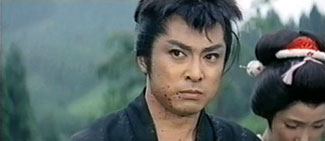 Eichi Kudo's Death Duel (Ninkyo Kisogarasu, Toei, 1965) stars Ryutaro Otomo as that Robin Hood of old Japan, Chuji of Kunisada.
Eichi Kudo's Death Duel (Ninkyo Kisogarasu, Toei, 1965) stars Ryutaro Otomo as that Robin Hood of old Japan, Chuji of Kunisada.
In 1837, Chuji escaped from his province of Kiso, disguised as a deputy inspector chasing after, who else, Chuji of Kunisada.
But the story is less about Chuji than it is about Shinta (Hoshizo Okawa) who is framed for theft & imprisoned for one year, at last released when his girlfriend mortgages her inn to bribe the right people.
Shinta wants to clear his name & find revenge, so a lot of trouble ensues, all predicated upon the bad guys wanting Shinta's girlfriend, a conventional plot. Shinta's girl has sold herself to a bordello.
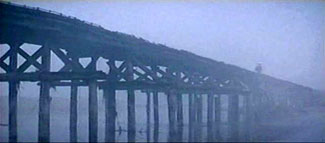 Another woman who is the "hooker with a heart of gold" is additionally quite good at throwing coins as shuriken-like weapons.Despite that she, too, is obviously in love with Shinta, she helps the two lovers get back together. Another woman who is the "hooker with a heart of gold" is additionally quite good at throwing coins as shuriken-like weapons.Despite that she, too, is obviously in love with Shinta, she helps the two lovers get back together.
She's much more interesting than the sappy girl Shinta loves, but not quite as pretty, so either Shinta goes for looks only, or he's beholden to his girl for sinking her own life to get him out of prison, though the script seems merely to assume they're crazy in love.
Hashizo Okawa is particularly handsome in this film & despite the trivial story, his graceful figure & excellent facial expressions make it a rewarding film. Otomo as Chuji is also pleasantly satisfactory.
Like his contemporary Chiezo Kataoka who also played Chuji both before & after the war, Otomo had been pretty much unemployable during the Occupation. His career bounced back hugely when McArthur & his ban on jidai-geki swordplay films were gone.
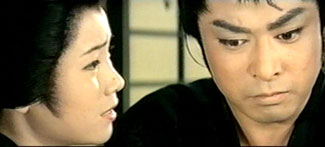 In the 1950s such stars were treated as vital leading men who could carry a film alone, but increasingly in the 1960s they would co-star with some younger star like Hashizo Okawa or Kinnosuke Nakamura, who were fast becoming a new generation's film idols. In the 1950s such stars were treated as vital leading men who could carry a film alone, but increasingly in the 1960s they would co-star with some younger star like Hashizo Okawa or Kinnosuke Nakamura, who were fast becoming a new generation's film idols.
In the end Chuji reveals himself & there's a suitable-for-children all-out-battle. Shinto, Chuji, & Chuji's partner kill off the bad guys in a free-for-all battle, saving helpless maidens.
In the aftermath of the mass-duel, Chuji gives a nice little lecture about not living a gambler's life, which moves Shinta, who goes off with his girl to live the honest life. With a touch of folksy music & an excess of sweetness & light, this is an entirely acceptable film of its kind.
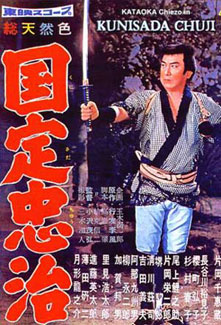 Chiezo Kataoka stars as Chuji in Shigehiro Ozawa's widescreen color film Chuji Kunisada: On National Authority (Kunisada Chuji, 1958), co-starring Kotaro Satomi, Hiroko Sakuramachi & Ryunosuke Tsukigata. This film's DVD box illustrates the top of this page.
Chiezo Kataoka stars as Chuji in Shigehiro Ozawa's widescreen color film Chuji Kunisada: On National Authority (Kunisada Chuji, 1958), co-starring Kotaro Satomi, Hiroko Sakuramachi & Ryunosuke Tsukigata. This film's DVD box illustrates the top of this page.
In the region of Kanto during the Tempo Era (1830-1843) there was an extensive drought resulting in massive loss of crops. The governors of some areas throughout the Kanto provinces gave extensions on land taxes which peasants paid with rice.
Delaying taxes in drought years was the difference between survival & starvation. But the governor over 170 farm villages of Joshu was greedy & corrupt & eager to take advantage of the rising value of rice. Desparate farmers were selling their daughters or even committing suicide under threat of starvation & the burden of the rice tax.
In the dark of night, gambling boss Chuji arrives in the garden of the governor's mansion. When the governor investigates the sound, Chuji prostrates himself saying he will suffer any punishment for his trespass & audacity, but to please help the farmers by delaying the rice taxation.
The more Chuji grovels in his request for humane treatment of the people, the more the governor balks at any decency. At last Chuji stands. The pleading tone is gone from his voice as he says gruffly, "I don't like to kill. But to save people from their living hell..."
The governor is slain & the rice storage house opened to the people. Chuji becomes a regional hero, but one who is forced to flee to Mount Akagi.
Rather than a single large story, the structure of the film is more like a set of four vignettes strung together, a lingering feature of the original serial novel's "travel diary" format adapted in the silent era. In the second chapter, constable Kansuke acknowledges Chuji's intentions were noble, but nevertheless he must arrest Chuji for the murder. The constable's nephew, Asataro, is a young follower of Chuji. The magistrate respects the young man's allegiance, though it sadly puts them on opposite sides of the law.
 As things unfold, young Asataro accidentally leads Chuji into his uncle's arms, & Chuji barely escapes. Chuji's henchmen afterward believe Asataro betrayed Chuji & demand he leave Mount Akagi. As things unfold, young Asataro accidentally leads Chuji into his uncle's arms, & Chuji barely escapes. Chuji's henchmen afterward believe Asataro betrayed Chuji & demand he leave Mount Akagi.
The young man is so hurt & shamed that he sets out to assassinate his beloved uncle. When he realizes he cannot do such a thing, his uncle throws himself upon Asataro's sword & while dying says, "I know how bad you must have felt to be called a traitor. Take my head & show them." He makes Asataro promise to raise Kantaro, the constable's little boy, to be an honest man, & not a yakuza.
Chuji is heartsick to learn what has happened, & everyone is apologetic toward Asataro while weeping over the head of Kansuke. Because of this killing, a large number of samurai start up the mountain to hunt down Chuji's men, some of whom are killed, the rest scattered. Asataro, with his tiny nephew Kantaro on his back, goes down fighting at Chuji's side, & passes his uncle's last wish to Chuji, to see that the boy is raised to be an honest man.
Most of the bad guys & a couple good ones lay dead on the mountain by the end of this part of the episodic film. Chuji & little Kantaro start out along the road to Shinshi. Chuji realizes that if he keeps the boy with him while constantly on the run from the law, Kantaro will surely grow up to be a yakuza like Chuji, & another option is required if the boy is to grow up honest.
Along the road he reconnects with his old girlfriend Osen, now a restaurant owner of a small town. Suddenly we're in the midst of the third of this string of tales, learning something of Chuji's past when he almost became an honest married man.
The action-climax of this segment pits Chuji against three ruffians who defrauded Osen's restaurant. Chuji gives the men every opportunity to make right the ill deed they have done, but once again bad guys remain bad guys & make the sorry choice of attacking Chuji. Before Chuji draws his sword, he calls out to the boy clinging to his back, "Kantaro! Close your eyes!" then takes down the thugs violently. Afterward Kantaro finds an honest home when Osen promises to raise him as though he were her own son.
The fourth & last episode is the best played. Kieumon, a desperately poor old man who has incurred the impossible task of raising raise a hundred ryo, sells his grown daughter into a term of service as a maid in the house of a Shinshu constable. She afterward learns she is actually going to be forced into prostitution, as the constable is simultaneously a gangster whose house is a bordello. Plus the gangster-constable sent thugs to rob the old man of the hundred ryo. Chuji happens along just in time to keep Kieumon from hanging himself in the woods.
There follows an extensive, amusing, actorly piece wherein Chiezo as Chuji poses as a naive peasant representing "my only uncle" trying to convince the gang boss to give the old man another hundred ryo. The gangster-constable says he already took pity on the old man & paid him more than his daugther's service was worth, & certainly couldn't pay for her a second time. Chuji half-jestingly lets slip that he believes the boss had sent henchmen to rob the old man, so it's not a matter of paying twice.
This bad guy has no intention of doing the right thing, so Chuji reveals who he really is, no longer the naive but persistent peasant but a dangerous outlaw intent on justice. With false politeness it becomes clear that Chuji's ultimate goal is not only to get the old man his hundred ryo, but also to get back indenture contract for his daughter. It's simply a wonderful portrayal of Chuji at his best, using his wit & strength of personality rather than his sword to achieve just ends.
But as it's an action film, the non-violent conclusion isn't about to stand. After the right thing has been done & Chuji has gone along his way, the bordello owner's wife berates him until he calls together all his followers & decides to do his constable duty & go arrest or kill Chuji.
Waylaying Chuji along the road, the gangster-constable holds forth his jitte truncheon symbolic of law enforcement officers, & demands Chuji submit to arrest. Men surround him with their swords drawn. Chuji lets it be known he is not about to be arrested by such a crooked authority, so a final one-against-all duel is on the brink of erupting.
Before he draws his own sword, Chuji makes reference to an actual folk song, asking, "Have you heard this song before: 'Kunisada Chuji is scarier than a demon.'" He then engages the whole lot for a bloody finale.
For an upbeat family film, the swordplay is surprisingly brutal, with a brilliant soundtrack consisting exclusively of taiko drums (heard from a nearby festival) to accompany the slaughter. There's a persisting air of tragedy. In the end, as Chuji stands among the corpses he has riven, holding his sword before him to address it as life-saving friend & companion, this great "sword of Komatsu Goro Yoshikane" a famous swordsmith.
This film is simply great unpresuming fun, & conveys the basic Chuji legend in pleasing fullness. Chiezo Kataoka was getting long in the tooth by 1958 & is perhaps a bit old & flabby to be playing these sorts of action roles, but fact is, he's great & convincing even as an aging actor. He'd been a big jidai-geki star in the 1920s through 1940s, but during the Occupation he had no career at all, McArthur's occupation rule having banned jidai-geki as too militaristic for a conquered Japan.
When McArthur was gone, jidai-geki films returned with a passion, increasingly prone to challenging authority with characters like Chuji, & stars of a previous generation, like Chiezo Kataoka & Ryutaro Otomo, were brought back to recreate the sorts of roles they had already become famous for when they were younger actors. An awful lot of the pre-war films were destroyed either during bombings or intentionally during the Occupation, & the great roles these actors played might often have been lost to us, except that they recreated their performances in the 1950s & early '60s mainly for Toei Studios.
|
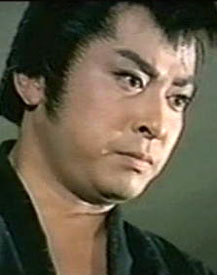

 Another woman who is the "hooker with a heart of gold" is additionally quite good at throwing coins as shuriken-like weapons.Despite that she, too, is obviously in love with Shinta, she helps the two lovers get back together.
Another woman who is the "hooker with a heart of gold" is additionally quite good at throwing coins as shuriken-like weapons.Despite that she, too, is obviously in love with Shinta, she helps the two lovers get back together. In the 1950s such stars were treated as vital leading men who could carry a film alone, but increasingly in the 1960s they would co-star with some younger star like Hashizo Okawa or Kinnosuke Nakamura, who were fast becoming a new generation's film idols.
In the 1950s such stars were treated as vital leading men who could carry a film alone, but increasingly in the 1960s they would co-star with some younger star like Hashizo Okawa or Kinnosuke Nakamura, who were fast becoming a new generation's film idols.
 As things unfold, young Asataro accidentally leads Chuji into his uncle's arms, & Chuji barely escapes. Chuji's henchmen afterward believe Asataro betrayed Chuji & demand he leave Mount Akagi.
As things unfold, young Asataro accidentally leads Chuji into his uncle's arms, & Chuji barely escapes. Chuji's henchmen afterward believe Asataro betrayed Chuji & demand he leave Mount Akagi.